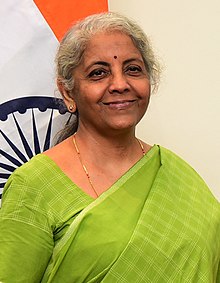
Introduction
Nirmala Sitharaman is one of India’s most influential political leaders, currently serving as the Union Minister of Finance and Corporate Affairs. Her academic background and early life played a significant role in shaping her journey from an economics student to the first full-time woman Finance Minister of India.
Born in a Tamil Brahmin family, Sitharaman’s education at Seethalakshmi Ramaswami College, Tiruchirappalli, and Jawaharlal Nehru University (JNU), New Delhi, laid the foundation for her expertise in economics, global trade, and governance.
This article explores Nirmala Sitharaman’s early life, family background, schooling, and higher education, providing SEO-rich content to enhance Google search rankings.
Birth and Family Background
- Full Name: Nirmala Sitharaman
- Date of Birth: August 18, 1959
- Place of Birth: Madurai, Tamil Nadu, India
- Father: Narayanan Sitharaman (Railway employee)
- Mother: Savitri Sitharaman (Homemaker)
Nirmala Sitharaman was born in Madurai, Tamil Nadu, into a Tamil Iyengar Brahmin family. Her father, Narayanan Sitharaman, worked in the Indian Railways, which led the family to move frequently across different cities. This exposure to various cultures and places contributed to her adaptability and diverse worldview.
Her mother, Savitri Sitharaman, was deeply interested in literature, which influenced Nirmala’s early inclination towards academics and public discourse.
Schooling and Early Education
Nirmala Sitharaman completed her school education in Tamil Nadu and Andhra Pradesh, due to her father’s transferable railway job. She was an academically bright student, excelling in subjects like economics, history, and political science.
Her early education laid a strong foundation for her interest in economic policies and governance, subjects that she later pursued in higher education.
Undergraduate Studies – Seethalakshmi Ramaswami College, Tiruchirappalli
- Degree: Bachelor of Arts (B.A.) in Economics
- Institution: Seethalakshmi Ramaswami College, Tiruchirappalli (Affiliated to Bharathidasan University, Tamil Nadu)
Nirmala Sitharaman pursued her undergraduate studies in Economics from Seethalakshmi Ramaswami College, Tiruchirappalli. This prestigious college is known for its strong academic programs and has produced many distinguished professionals.
Her interest in macroeconomics, fiscal policies, and global trade began during her B.A. studies, where she analyzed economic theories and their impact on developing nations like India.
During her time in college, Sitharaman was known for her keen analytical skills and leadership abilities, which later became essential in her political career.
Postgraduate Studies – Jawaharlal Nehru University (JNU), New Delhi
- Degree: Master of Arts (M.A.) in Economics
- Institution: Jawaharlal Nehru University (JNU), New Delhi
After completing her B.A. in Economics, Nirmala Sitharaman pursued a Master of Arts (M.A.) in Economics from Jawaharlal Nehru University (JNU), New Delhi.
Her time at JNU played a crucial role in shaping her economic and policy perspectives. The university, known for its rigorous academic environment, provided her with deep insights into:
- Economic policies and trade relations
- India’s financial system and governance
- Macroeconomic development and fiscal management
JNU helped her analyze global economic trends and their impact on India, a skill that would later define her role as India’s Finance Minister.
Specialization – M.Phil. in Economics (JNU, New Delhi)
Nirmala Sitharaman also pursued an M.Phil. (Master of Philosophy) in Economics at JNU, where she focused on:
- India’s foreign trade policies
- World Trade Organization (WTO) agreements
- Global economic relations
Her M.Phil. research helped her understand India’s position in international trade and global financial structures, which became essential in her later roles as Commerce Minister and Finance Minister.
Influence of Education on Her Career
Nirmala Sitharaman’s academic background in economics and global trade became the foundation for her career in policymaking and governance. Her education at Seethalakshmi Ramaswami College and JNU gave her:
- Expertise in Economic Policies – Understanding of macroeconomics, fiscal strategies, and trade regulations.
- Knowledge of International Trade – Research on WTO, global financial institutions, and India’s trade relations.
- Leadership Skills – JNU’s academic culture helped her develop policy-making, negotiation, and governance abilities.
Her deep understanding of economic policies and governance helped her become India’s Finance Minister, where she played a crucial role in:
- Union Budgets and Economic Reforms
- COVID-19 Financial Relief Packages
- Corporate Tax Cuts and Digital Economy Growth
Conclusion
Nirmala Sitharaman’s early life and education played a vital role in shaping her journey from an economics student to India’s Finance Minister. Her strong academic foundation in economics, trade, and governance prepared her for a successful career in policy-making and financial management.
With a Bachelor’s degree in Economics from Tiruchirappalli and a Master’s & M.Phil. from JNU, she developed a deep understanding of macroeconomic policies, trade regulations, and fiscal management. Today, she is one of India’s most powerful women leaders, influencing key financial decisions and shaping India’s economic growth.
Reference Websites
Nirmala Sitharaman’s Early Life & Education
BBC News – Nirmala Sitharaman’s Economic Policies – www.bbc.com
Seethalakshmi Ramaswami College, Tiruchirappalli – www.srcollege.edu.in
Jawaharlal Nehru University (JNU), New Delhi – www.jnu.ac.in
Ministry of Finance, India – www.finmin.nic.in
The Hindu – Profile of Nirmala Sitharaman – www.thehindu.com